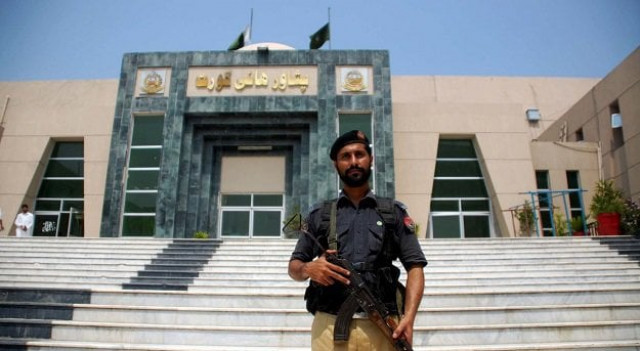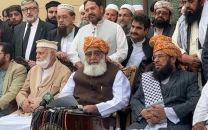Military court convicts denied sentence relief
PHC rules Section 382-B benefit already granted; dismisses 25 writ petitions

The Peshawar High Court has dismissed a set of writ petitions seeking the benefit of Section 382-B of the Criminal Procedure Code for convicts sentenced by military courts. In its detailed eight-page verdict, the court ruled that the convicts were tried and sentenced under a special law - the Pakistan Army Act — and had already been granted the benefit in question. Therefore, the petitions were found to be without merit.
The judgment was delivered by a two-member bench comprising Justice Naeem Anwar and Justice Dr Khurshid Iqbal, which heard 25 separate writ petitions, including one filed by Gul Muhammad Khan.
The petitioners argued that their relatives were tried under the Pakistan Army Act, 1952, and handed various terms of imprisonment. In one case, it was claimed that Riaz Ali, a relative of the petitioner, was arrested on April 30, 2013, and sentenced to seven years of rigorous imprisonment by a military court.
Despite having completed his sentence, he has allegedly remained in prison for over 11 years — a violation of his fundamental rights as guaranteed by the Constitution. The petitioner contended that since no other criminal case was pending against Riaz Ali, his continued detention was unlawful and unconstitutional, violating Articles 9, 13, 14, and 25 of the Constitution.
The petitioners' legal counsel also raised the question of whether Section 382-B, which mandates deduction of pre-trial custody from the total sentence, had been properly applied. While acknowledging that the benefit of Section 382-B was, in principle, granted, the lawyers argued that the authorities had failed to release the convicts even after completion of their sentences.
They cited two previous cases in which relief was granted to similarly situated individuals.
On the other hand, Additional Attorney General Sanaullah submitted that the sentences were imposed under a special law, the Army Act, which takes precedence over general laws. He affirmed that Section 382-B had been applied and that the convicts were being dealt with in accordance with the Army Act.
Court-appointed amicus curiae Advocate Shumail Ahmed Butt argued that under Articles 199(3) and 199(5) of the Constitution, the High Court lacks jurisdiction in such matters. He also pointed out that the cases cited by the petitioners were not adequately argued and did not set binding precedent.
In its written verdict, the court held that the convicts were lawfully tried under the Army Act, a special statute, and that their sentences commenced from the date of confirmation by the military court. After reviewing various precedents, the bench concluded that Section 382-B had indeed been applied appropriately. Consequently, the petitions were dismissed.



















COMMENTS (1)
Comments are moderated and generally will be posted if they are on-topic and not abusive.
For more information, please see our Comments FAQ